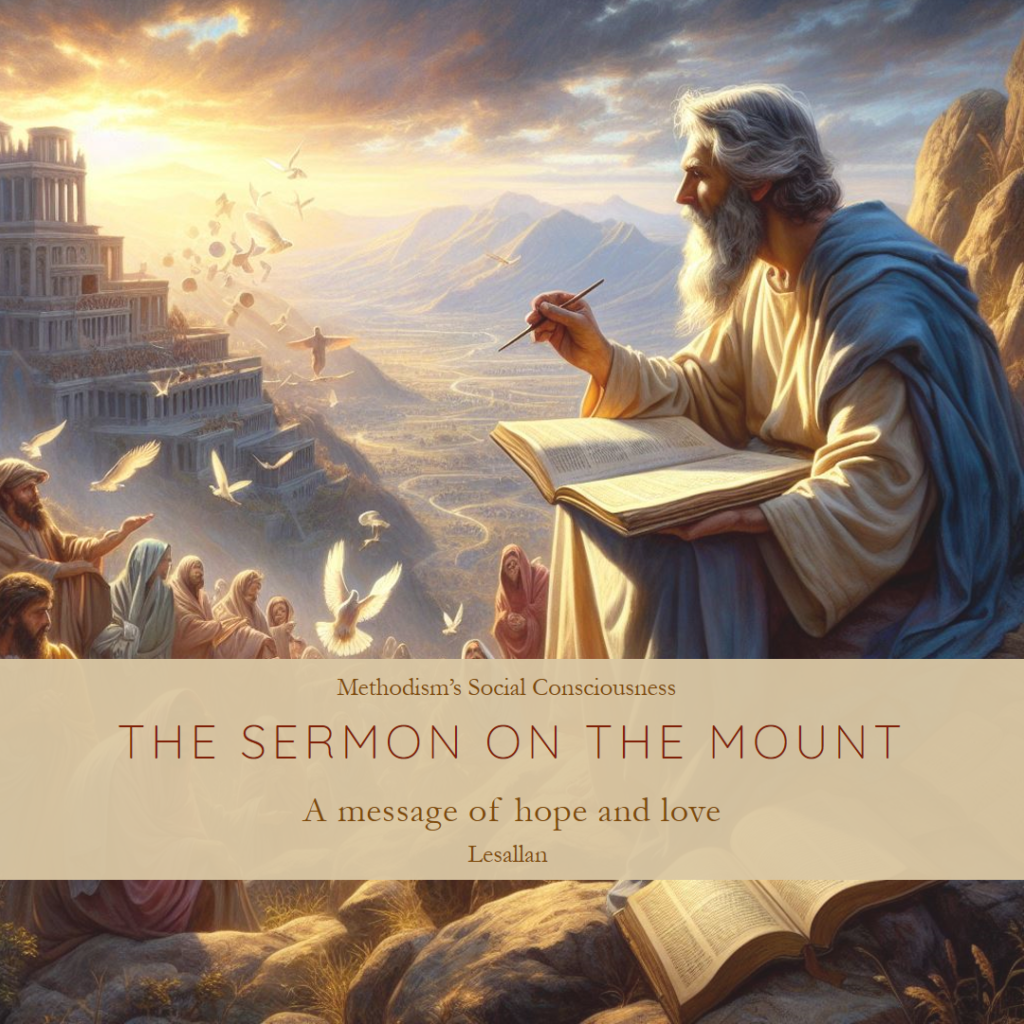Written by Lesallan – January 28, 2024

Methodism’s Social Consciousness
Written by Lesallan – January 28, 2024
Ohio Christian University
THE3360 Theology of John Wesley (ONLSP24)
Dr. Steven Gerig
January 28, 2024
Methodism’s Social Consciousness
Christianity is one of the most widely practiced religions in the world, and Christian theology has been a subject of intense study and interpretation for centuries. Among the various aspects of Christian theology, the teachings of Jesus Christ, particularly the Sermon on the Mount (Matthew 5-7, KJV), hold a place of paramount importance. These teachings have been passed down through generations, inspiring people to live better lives and fostering a sense of community among believers. One such interpretation of the Sermon on the Mount is by John Wesley (1872), the founder of Methodism, who offers a profound commentary on the fourth part of the Sermon in his 24th Sermon. Wesley’s interpretation of the teachings is significant, as he brings his unique perspective to the table, influenced by his life experiences and understanding of the scriptures. In this essay, I aim to delve into Wesley’s interpretation of these teachings, his concept of social holiness, and his views on the roles of the Church and individual Christians in society.
Wesley’s interpretation of Jesus’ teachings emphasizes the significance of inner piety and external benevolence. According to Wesley, Jesus warns his followers against the dangers of insincerity, ostentation, and self-righteousness in their religious practices, such as almsgiving, prayer, and fasting. Instead, Jesus instructs them to perform these actions discreetly, with sincerity and humility, looking for only God’s approval and reward. Furthermore, Wesley clarifies that Jesus recommends that his disciples eschew worldly anxieties and attachment to material possessions, urging them to depend on God’s providence and prioritize the pursuit of His kingdom and righteousness.
Wesley’s views on Jesus’ teachings highlight the importance of living a life of sincerity and humility. He believes true piety is not a matter of external rituals or practices, but rather an inward commitment to God and a desire to do His will. Wesley argues that pursuing material possessions and worldly anxieties can distract one from pursuing God’s kingdom and righteousness. Instead, he encourages his readers to live a life of simplicity, focusing on the inner transformation of the heart and cultivating virtues such as love, compassion, and generosity towards others. In this way, Wesley’s interpretation of Jesus’ teachings offers a timeless message of hope and inspiration for all those looking to live a life of purpose and meaning.
Wesley’s interpretation of Jesus’ teachings is significant and inspiring. His concept of social holiness is based on the foundation of love and compassion. He believes social holiness is an individual virtue and a communal obligation. He believed true Christianity entails caring and loving God and our fellow human beings. Wesley’s teachings emphasize that Christians are responsible for living harmoniously, supporting one another, sharing each other’s burdens, encouraging each other, and aiding the underprivileged. He believed social holiness is an essential and integral part of Christianity, not an optional or secondary aspect. His famous declaration, “there is no holiness but social holiness” (Wesley, 1739), resonates with the idea that one cannot reach holiness without compassion and kindness to others. Wesley’s teachings inspire millions worldwide, and his concept of social holiness is still essential to the Christian faith today.
Wesley’s understanding of social holiness shapes his perspective not only on the role of the Church, but also on individual Christians in society. For Wesley, the Church is not just a spiritual community, but a moral agent tasked with promoting justice, peace, and welfare in the world. He challenges the Church to serve as a prophetic voice that condemns sin and oppression while simultaneously acting as a compassionate hand that alleviates suffering. According to Wesley, the Church’s mission is to transform society by promoting the values of the kingdom of God on earth.
Furthermore, Wesley encourages individual Christians to be active citizens, participate in public affairs, support virtuous causes, and oppose malevolent ones. He advocates that Christians should not conform to the world but strive to transform it through their example and influence. Wesley believed that Christians must promote the common good and be agents of change in their communities.
Wesley’s vision of social holiness offers a powerful challenge to Christians today. In a world marked by injustice, inequality, and division, Wesley’s call to promote justice, peace, and welfare is as urgent today as it was in his time. His emphasis on the Church’s prophetic voice and compassionate hand reminds us that the Church has a vital role in promoting the common good. Similarly, his call for Christians to be active citizens and agents of change challenges us to be more than mere observers of the world, but active participants in transforming our communities.
In summary, John Wesley’s 24th Sermon supplies a comprehensive and relevant interpretation of Jesus’ words in the Sermon on the Mount. It presents a faith of love that encompasses inward piety and outward benevolence, and it underscores the Church’s roles and individual Christians’ roles as agents of service and change. This interpretation invites us to introspect and contemplate our faith and conduct, encouraging us to adhere more faithfully and fruitfully to Jesus’ teachings. Wesley’s interpretation of the Sermon on the Mount and his concept of social holiness offer valuable insights into the essence of Methodism and its social consciousness.
References:
McMaster, J. (2002). Wesley on Social Holiness. Retrieved from: https://www.methodist.org.uk/downloads/wc_Eur_John_Mcmaster_Wesley_on_Social_Holiness.pdf
Wesley, J. (1872). Sermon 24 – Upon Our Lords Sermon on the Mount 4. ResourceUMC. https://www.resourceumc.org/en/content/sermon-24-upon-our-lords-sermon-on-the-mount-4


